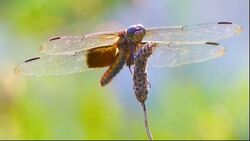[Seminar Blog] Serving the Public as a Government Scientist: Career tracks and opportunities11/18/2022
written by: Amanda Brucchieri and Robert Salerno
Have you ever thought of pursuing a career within the federal government? Do you know what opportunities exist for research, extension, and policy/regulation? During this week’s colloquium talk, Dr. Chris Peterson, an International Food Security, and Pest Management Professional working for the USDA Foreign Agriculture Service, passed on his knowledge and wisdom about career paths within the federal government. He wanted to bring a personal perspective to the field of government employment and help students navigate their next steps as future scientists so he came on his own time and was not speaking as a representative of the USDA. Dr. Peterson holds a Ph.D. in Entomology and Toxicology from Iowa State University and has held several positions within the Forest Service, Peace Corps, and currently, the Foreign Agricultural Service. The College talks to Dr. Espíndola about latest paper:
Climate change is taking a serious toll on insects, UMD Entomology's Anahí Espíndola and dozens of scientists from around the world warned in a new paper published by the Ecological Society of America. “We need to realize, as humans, that we are one species out of millions of species, and there's no reason for us to assume that we’re never going to go extinct,” Anahí said. “These changes to insects can affect our species in pretty drastic ways.” Link to full press release here>> Graduate Student Mariom A. Carvajal (Shultz Lab) co-authors report with Universidad de Magallanes researcher Eduardo I. Faúndez on the southernmost lacewing - Hemerobiidae. This documentation of Hemerobiidae extends the known distribution of lacewings about 110km further south than previously recorded. https://go.umd.edu/cKn
Registration open for The American Association for the Advancement of Science’s Charles Valentine Riley memorial lecture held Nov 30, 2022. Dr. Douglas Landis Michigan State University will present "Designing Pest Suppressive Agricultural Landscapes for a Changing World. '' Followed by panel discussion led by noted researchers, including ours truly, Dr. Megan Fritz, Asst Prof, University of Maryland. Register for the event: https://www.aaas.org/riley-lecture
Share on twitter and facebook written by: Ben Burgunder & Eric Hartel
How can modeling and mathematics inform our research of macroevolution? Towson University professor Dr. Daniel Caetano visited the University of Maryland's entomology department to deliver a lecture on his many research interests. Dr. Caetano explores evolution through mathematical modeling and novel approaches to phylogenetic comparative methods. Phylogeny is the scientific approach to understanding the evolutionary relationships between groups of organisms and phylogenomics is the application of genomics to phylogenetics research. Dr. Caetano explained that his research is supported by two pillars: trait evolution and species diversification. He discussed two examples of developing novel methodology from published, publicly available datasets. written by: Minh Le
Not many people have heard of the sorghum plant, so you might be surprised to know that it is grown in 21 states (Figure 1)! The “Sorghum Belt”, or area comprising states that have abundant sorghum production, stretches from South Dakota all the way down to southern Texas (National Sorghum Producers). The sorghum plant produces nutritious grain, which is an important ingredient for livestock feeds as well as a whole grain alternative to people with low gluten tolerance or who suffer from celiac disease. Besides its nutritional benefits, sorghum production can have a positive impact on the environment and sustainability efforts, as the sorghum bushels can be extracted for ethanol, a renewable source of fuel, and require one-third less water to grow compared to other feedstocks (National Sorghum Producers). Despite its agricultural and environmental importance, as with other widely cultivated agricultural crops, these plants are a buffet for pest insects whose voracious appetite cause significant economic damage every year. A prominent invasive pest feeding on sorghum in the US is the sorghum aphid (Melanaphis sorghi). These insects use their syringe-like mouthparts to pierce and suck juices from plant tissues, damaging them. In 2013 and 2014, it is estimated that these aphids caused 50 to 100% of crop loss, and in 2015, sorghum producers in the Rio Grande Valley lost approximately 31 million dollars. The entomology colloquium welcomes Dr. Jocelyn Holt, a researcher at Rice University, Texas, who provided insight into her research on the population genetics of sorghum aphids across the US and the symbiotic microbiota that is associated with them. |
Categories
All
Archives
June 2024
|
Department of Entomology
University of Maryland
4112 Plant Sciences Building
College Park, MD 20742-4454
USA
Telephone: 301.405.3911
Fax: 301.314.9290
University of Maryland
4112 Plant Sciences Building
College Park, MD 20742-4454
USA
Telephone: 301.405.3911
Fax: 301.314.9290


 RSS Feed
RSS Feed




